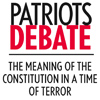Probing Questions: Experts Debate the Need to Create Exceptions to Rules on Coerced Confessions
Former FBI Special Agent Coleen Rowley didn’t exactly shout out “I told you so!” But she gloated when she scribbled it atop a blog account after officers caught and questioned the suspect in the attempted Times Square bombing.
“After so many years of waiting and warning,” Rowley told the Huffington Post in a May 5, 2010, column, “it was nonetheless gratifying to see several news accounts yesterday revealing the FBI finally relied on the ‘public safety exception’ ” to the landmark 1966 U.S. Supreme Court case Miranda v. Arizona to interview Faisal Shahzad. The exception lets officers collect potentially life-saving information from a suspect before warning him of his legal rights.

Read all the articles in the Patriot Debate series:
WAR POWERS
- • Constitutional Dilemma: The Power to Declare War Is Deeply Rooted in American History by Richard Brust
- • War Powers Belong to the President by John Yoo
- • Only Congress Can Declare War by Louis Fisher
TARGETED KILLINGS
- • Uneasy Targets: How Justifying the Killing of Terrorists Has Become a Major Policy Debate by Richard Brust
- • Targeted Killing Is Lawful If Conducted in Accordance with the Rule of Law by Amos N. Guiora and Monica Hakimi
CYBERWARFARE
- • Cyberattacks: Computer Warfare Looms as Next Big Conflict in International Law by Richard Brust
- • What Is the Role of Lawyers in Cyberwarfare? by Stewart A. Baker and Charles J. Dunlap Jr.
COERCED INTERROGATIONS
- • Probing Questions: Experts Debate the Need to Create Exceptions to Rules on Coerced Confessions by Richard Brust
- • Should We Create Exceptions to Rules Regarding Coerced Interrogation of Terrorism Suspects? by Norman Abrams and Christopher Slobogin
Next Topic: DOMESTIC TERRORISM
Rowley knows about investigating suspected terrorists. In August 2001, her Minneapolis office was busy probing a French citizen named Zacarias Moussaoui, who was held after his arrest on immigration charges. The FBI wanted to know why he had paid a flight school to learn how to maneuver a Boeing 747 jet.
The bureau sent more than 70 emails to FBI headquarters for permission to get a warrant to search Moussaoui’s laptop computer, but the higher-ups rebuffed them. Unbeknownst to the Minneapolis bureau, FBI agents in Phoenix had warned that operatives of the terrorist group al-Qaida had also been enrolled in flight training schools in the Southwest.
On the afternoon of Sept. 11—with the World Trade Center in ashes and the Pentagon in flames—and again the next morning, Rowley implored FBI headquarters to allow agents to interrogate Moussaoui. She cited the public safety exception, established by the high court in the 1984 case of New York v. Quarles.
“Although there was speculation for days as to whether more hijacked planes were heading our way,” Rowley wrote, the answer from Washington was no dice.
In May 2002, Rowley unleashed a 13-page screed to FBI Director Robert Mueller, admonishing the agency for stepping in the way of the terrorism investigation.
Particularly, she said, “if prevention rather than prosecution is to be our new main goal (an objective I totally agree with), we need more guidance.” She added, “We were prevented from even attempting to question Moussaoui on the day of the attacks, when, in theory, he could have possessed further information about other co-conspirators.”
Nine years later, Rowley wrote in HuffPost, the agency seemed finally to get its constitutional law correct.
Shahzad was nabbed May 3, 2010, as he tried to board a flight to Dubai. Two days earlier, Times Square street vendors told police they spotted smoke billowing out of a parked SUV. A bomb squad dislodged a homemade device of alarm clocks, wiring, gas and propane tanks, explosives and a bag of urea-based fertilizer—enough, police said, to form a fireball in the crowded theater district.
Click here to read the rest of “Probing Questions” from the June issue of the ABA Journal.



